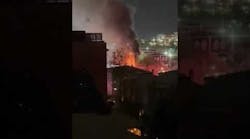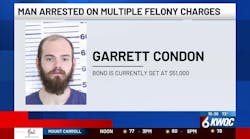July 15--SCRANTON -- Firefighters here have been running into burning buildings for $7.25 an hour.
"That can inhibit how you perform," said firefighter Bob Zoltewicz, 32, the married father of two, ages 2 and 5 months. "You have to try to keep that salary out of your mental state."
Since the mayor of this financially distressed city decided to deal with budget woes by paring the paychecks of all 400 city workers to minimum wage a week ago, it has been difficult for people to think about much else.
And that kind of distraction, which has made national news, is tough to handle when you labor at life-and-death jobs.
"We come to work regardless of what's happening politically," said Zoltewicz, who was called to a two-alarm blaze at an abandoned property on the city's west side last week. "But $7.25 an hour is crippling."
For police officers, it's the same problem, as they must reconcile the head-spinning fact that there are local high school students with summer jobs scooping ice cream in town who are making $1.25 an hour more.
"It's hard for officers to function with this situation over their heads," said Detective Lt. Bob Martin, president of the Fraternal Order of Police, many of whose members usually make about $56,000, similar to firefighters' salaries. Martin himself said that under the new wage rules, he took home $408 for two weeks' work, about $1,500 short of his normal salary.
He added that, to help defray the 80 percent pay cut, some officers have been selling personal weapons they had bought to augment standard police-issued firearms.
"Now my guys are sacrificing personal and public protection by giving up their personal rifles because these clowns in city government are being dysfunctional and can't figure things out," Martin continued.
"A police officer's got to be focused, and maybe you're not as sharp if you're sitting in the patrol car worrying about how you're going to pay the mortgage on $7.25 an hour. This is the kind of thing that could distract us into oblivion."
Scranton's issues are complex and trace back to years of difficulties. The city of 76,000 mostly white ethnic residents loses population, which erodes the tax base and makes it harder to pay for services.
High poverty
Meanwhile, as foreclosures have increased while development has stalled, city infrastructure has been rapidly deteriorating. And because of either mismanagement or bad luck -- no one agrees which -- Scranton is seen by banks as a poor bet, and has a hard time getting loans.
Currently, there is a $16.8 million budget shortfall, and Mayor Christopher Doherty has said the city requires a 78 percent property-tax hike over the next three years or must face draconian service cuts.
The City Council balked at the huge increase. "People can't afford that," Council President Janet Evans said in an interview, explaining that Scranton is a blue-collar city with 24 percent poverty and a high number of unemployed and elderly residents.
Doherty, along with the city's solicitor, its business administrator, and other officials, did not return repeated phone calls seeking comment.
Council suggested other ways of creating revenue, such as enhanced parking-meter programs, a tax on parking lots, a commuter tax, and getting more tax money from nonprofits.
'Lines in the sand'
The mayor and Council couldn't agree on the proposed remedies. "This is all personality politics," said Jean Harris, a political science professor at the University of Scranton whose specialty is local and state government.
While the mayor and all five council members are Democrats, their unusually vitriolic personal antagonism has created a dicey oil-and-water combination that is withering the city, Harris said.
"Both City Council and the mayor are drawing lines in the sand, and that is not the way government works."
Saying he had no choice because city coffers had dwindled to just $5,000, Doherty announced the reduction of city workers' hourly wages to $7.25, including his own.
"That's a unilateral and illegal act," Evans said.
Unions representing city workers sued and got an injunction, saying the cuts were against the law because employees' contracts were being violated. But Doherty went ahead with his plan anyway, explaining that he had no choice.
The unions have asked that Doherty be found in contempt, since he violated a court order. A hearing on the matter is expected in the near future.
Several city officials now say that there is much more than $5,000 on hand -- that the city actually has $1.3 million set aside for payroll, and that the mayor was disingenuous when he named the lower amount since he wasn't taking into account revenues that he knew would be pouring in.
"They can't even agree on how much is in the bank account," Harris said. "So it's really hard for them to address their financial problems."
It's not surprising that the high-profile fight between mayor and Council is riling the city.
Around Courthouse Square the other day, residents sat in the shadows of stately stone buildings and vented.
"This is bad, ridiculous, and sad," said Gwendolyn Smith, 50, a certified nurse's aide who doesn't work for the city but is close to people who do.
"The folks I know are devastated, afraid they may lose their homes. They need to get it together, the people running this city."
Stanley Romanowski, 65, who was picking up someone in his car, echoed Smith's words, saying, "The mayor and Council are butting heads for so long. It's ridiculous."
Outside the castle-like city hall, replete with stone turrets, one city worker after another refused comment, some smiling and shaking their heads as they were asked about their new predicaments.
"It's a Mexican standoff in there," said one woman who begged that her name not be used for fear of being fired.
At nearby Abe's Deli, a manager asked that his name not be published, saying that in a small city where so many people know one another, the entire matter has become too polarized.
"We know people who work for the city who are suffering," he said, as waitresses scurried to serve steaming pastrami sandwiches. "But we're also close with the mayor. They're all our friends."
To lend a hand, the manager said he has been discounting lunches for city workers.
"I want to help, but it's hard to take a side," he said.
Worried that they will get compensated at $7.25 an hour again on Friday, the next municipal payday, workers are beginning to panic.
"How long can it last?" asked John Judge, president of the Scranton firefighters' union. "How long can $7.25 an hour sustain people? I feel insulted, like a pawn in this fight between the mayor and City Council.
"At the same time, my guys are doing dangerous work for low pay."
On Thursday, state officials indicated they might be able to lend the city $2 million, but the details were not clear.
'A real city'
Meanwhile, some people may be moving on. Hearing about the city's plight, police officials in Fayetteville, N.C., contacted Martin of the FOP to say there may be 15 openings for police officers there, Martin said. He added: "I told my guys maybe they can see what it's like to work for a real city."
For those left behind, the pain continues. Harris said the only solution may be bankruptcy, although no one is talking about that openly yet.
One thing is certain, she added: "People can't function this way. You have a mayor and City Council who cannot communicate, and a whole city is suffering because of that."
Contact Alfred Lubrano at 215-854-4969 or [email protected].
Copyright 2012 - The Philadelphia Inquirer





